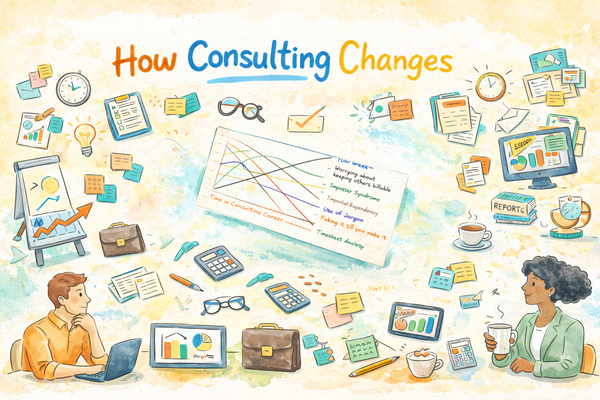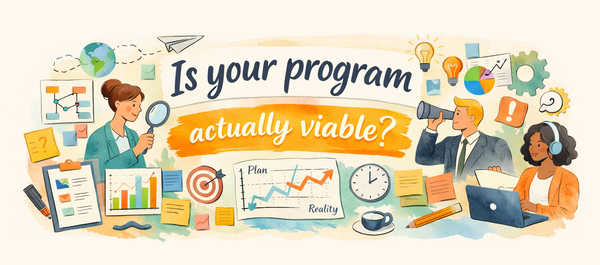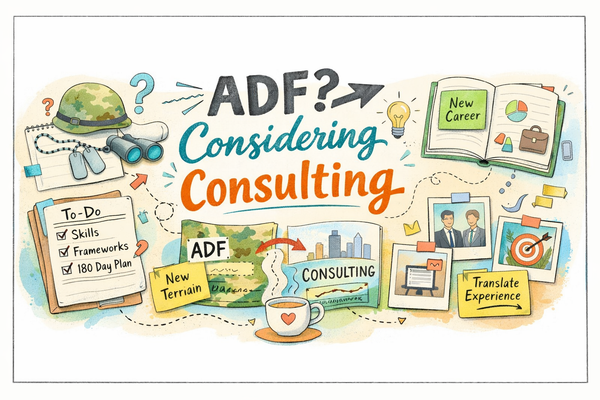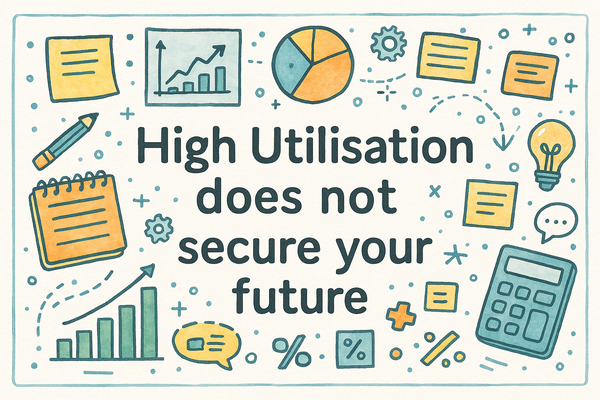Specialist or Generalist? (Spoiler: The Market Doesn’t Care)
My old career advice was simple: go wide before you go deep. But consulting has changed, and so has my view.

If you’re an early-career consultant, you’ve probably already heard the million-dollar career question: “Should I be a generalist or a specialist?”
The truth is that the market doesn’t care. Your boss or Partner doesn’t stay awake at night worrying about whether you’re “a future supply chain guru” or “a big-picture problem solver.” Clients don’t buy specialists or generalists. They buy trust, credibility, and results.
When I managed consultants in a Big 4, my mantra was simple:go wide before you go deep.Learn as much as you can. Try everything. Back then, I believed breadth came first and depth would follow. These days, my advice has shifted — always take the opportunity to go wide, no matter your experience, but also recognise your unfair advantage and go deep where it matters most. Keep expanding your range, but anchor your career in the thing you do better than almost anyone else.
The Myth of the One Right Path
Specialists are the “surgeons” of consulting – scalpel in hand, laser-focused, often paid handsomely to fix a very specific organ of the business body. Generalists are the “ER doctors” – juggling chaos, stabilising the patient, and making sense of ten symptoms at once. Both roles save lives.
The problem is, most consultants think they must choose one path and stick to it like a tattoo. The reality is that a sustainable consulting career is defined by your ability to adapt and evolve.
A friend of mine spent his entire career at one of the Big 4, starting as a graduate and finishing as a global partner. He told me he had six distinct careers within the same firm, starting out as the global expert in valuing forests. There was literally only one of him in the world at the time.
The highest-value consultants are shape-shifters.
On Monday, you’re the deep AI risk specialist. On Wednesday, you’re the translator connecting the finance team, IT, and HR who can’t speak the same language. On Friday, you’re the “calm adult in the room” when the board is panicking. That ability to switch modes is itself a specialisation.
Consulting Tip:
Instead of asking, “Should I specialise?” ask, “How fast can I learn and switch hats?” Adaptability is the only specialisation that never expires.
When Hyper-Specialisation Bites Back
Specialists command premiums — when there’s demand for their expertise. The blockchain consultant in 2018? Billable at $3,000 a day. The metaverse consultant in 2021? A week-long waitlist. And today, many of them are back to being “ex-consultants.”
Being ultra-specialised is like being the kid in school who can solve a Rubik’s Cube blindfolded; impressive, until nobody cares about Rubik’s Cubes anymore.
Consulting Tip:
If you’re an ultra-specialist, keep one eye on where the industry is going, not just what’s hot right now. Pair your niche with timeless consulting skills; storytelling, structured problem-solving, building trust. That’s your insurance policy.
The Counterintuitive Upside of Generalists
Here’s the truth you won’t hear in recruiting brochures: generalists often have more career mobility than specialists.
Generalists can pivot between industries, jump into government, or start businesses. In fact, many successful entrepreneurs began as generalist consultants who learned to spot patterns across industries.
It turns out that “jack of all trades, master of none” is incomplete. The full line is:
“Jack of all trades, master of none, but oftentimes better than master of one.”
Consulting Tip:
Deliberately take projects outside your comfort zone. You’ll build a portfolio of skills that lets you pivot later when the world inevitably changes.
Clients Buy People, Not Labels
You may think clients are comparing résumés, weighing “deep specialist” vs “versatile generalist.” But consulting is a relationship game. Clients buy from people they trust.
Even supposedly transparent clients — like government departments compelled to use “open” tenders — still buy from trusted firms and familiar consultants first.
The real client question is:
“Do I trust this person to solve my problem and make me look good?”
Consulting Tip:
Don’t obsess over your label. Obsess over building credibility and trust. That’s what gets you staffed, rehired, and recommended. Work on finding your unfair advantage.
The Hidden Specialisations Nobody Talks About
Most consultants think specialisation = industry (banking, mining) or capability (finance, HR). The reality is that you can specialise in:





